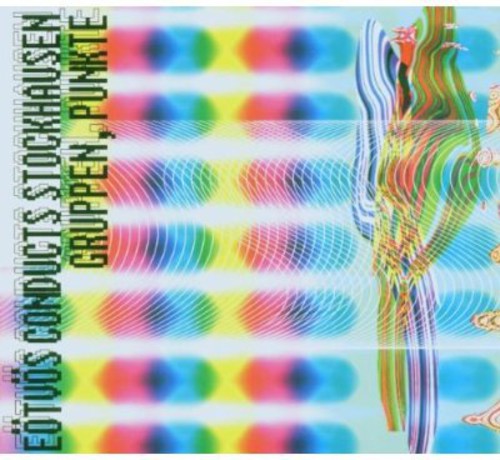Show results for
Deals
- 4K Ultra HD Sale
- Action Sale
- Alternative Rock Sale
- Anime sale
- Award Winners Sale
- Bear Family Sale
- Blu ray Sale
- Blu ray Special Editions
- Blues on Sale
- British Sale
- Classical Music Sale
- Comedy Music Sale
- Comedy Sale
- Country Sale
- Criterion Sale
- Electronic Music sale
- Hard Rock and Metal Sale
- Horror Sci fi Sale
- Kids and Family Sale
- Metal Sale
- Music Video Sale
- Musicals on Sale
- Mystery Sale
- Naxos Label Sale
- Page to Screen Sale
- Rap and Hip Hop Sale
- Reggae Sale
- Rock
- Rock and Pop Sale
- Rock Legends
- Soul Music Sale
- TV Sale
- Vinyl on Sale
- War Films and Westerns on Sale

Gruppen / Punkte
- (Digipack Packaging)
- Format: CD
- Release Date: 5/9/2006

Gruppen / Punkte
- (Digipack Packaging)
- Format: CD
- Release Date: 5/9/2006
- Composers: Karlheinz Stockhausen
- Conductors: Arturo Tamayo, Jacques Mercier, Peter Eötvös
- Orchestras: WDR Sinfonieorchester K ln, WDR Sinfonieorchester Köln
- Label: Budapest Music
- UPC: 5998309301179
- Item #: SDR301179
- Genre: Classical
- Release Date: 5/9/2006

Product Notes
Gruppen is written for an orchestra of 109 musicians, Straussian in size, but not in constitution: in addition to prominent parts for piano and electric guitar, it calls for no less than 12 percussionists. However, the most obvious novelty of this orchestra is that it is divided into three spatially separated groups - one to the left of the audience, one in front, and one to the right - each of which has it's own conductor. A primary reason for the three conductors is that, for much of the work, the three orchestral groups play simultaneously at different tempi. This notion of the possibility of different simultaneous tempi is one that has haunted many composers since. After the première of Punkte in 1963, Stockhausen wasn't entirely satisfied. Maybe the piece was caught a little between two stylistic worlds, and in places it was certainly rather discontinuous: perhaps too inclined to stop and start. The next year Stockhausen made a few initial revisions, but then, in 1966, he came back to the work again, and now the changes were more significant. As a result the work became several minutes longer. But even more striking, perhaps, is the introduction of many 'signals' and little melodic figures. This too is a sign of the times: the purism of the fifties had given way to the pluralism of the sixties, and one could take a certain delight in introducing 'foreign bodies' that would have been utterly taboo a decade earlier. Even then, though, Punkte hadn't quite achieved it's definitive form: the last touches were added in 1993, 30 years after the première (it is the 1993 version that is recorded here, for the first time on CD). The result is both extraordinary and unique: there's no other work that sounds or feels quite like the final version of Punkte. What started out as an apparently abstract conception finishes off as a work of almost startlingly visceral immediacy: an instance of savage sensuality that is perhaps unique in Stockhausen's work.

